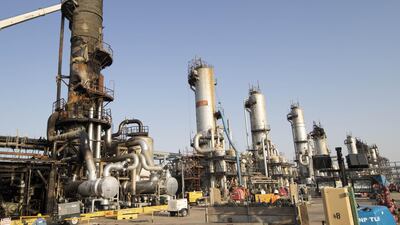With the attacks on Saudi oil facilities this month, energy security is back in the news headlines. The Abqaiq processing plant, with capacity to process 7 per cent of the world's crude petroleum, is unique: there will never be such a critical renewable energy facility anywhere. So will the very idea of "energy security" become obsolete in coming decades as oil and gas lose dominance?
The concept of energy security has become inextricably linked with hydrocarbons. Coal mines were an object of war in the industrial age, as Germans occupied mines in north-east France during the First World War. But, perhaps because the major powers all had their own coal resources, it was not seen as a strategic vulnerability.
Great Britain, when converting its fleet to oil power in 1912, was acutely aware of its dependence on the Anglo-Persian Oil Company for supplies. Lack of indigenous oil was a critical vulnerability for Nazi Germany and imperial Japan.
Crises punctuated the post-war period: the Iranian oil nationalisation of 1951, the Suez closure of 1956, the October War and oil embargo of 1973-4, the 1979 Iranian revolution and Saddam Hussein's 1980 attack on Iran, the 'Tanker War' in 1984-88, Saddam's 1990 invasion of Kuwait and subsequent expulsion,the 2003 US led war on Iraq, the 2011 Libyan revolution.
Gas crises have been less frequent and less severe, but cut-offs of Russian supplies to eastern Europe have occurred several times, usually due to payment and political disputes with Ukraine.
Sharp energy price hikes caused severe recessions, upended geopolitical relationships, swept in novel economic policies, and encouraged technologies to reduce dependence on oil imports. Oil from the North Sea, Alaska and Mexico in the 1980s eased the West's concerns over the power of Opec. A similar but even more dramatic development has been the explosive growth of US shale oil and gas, and the White House's proclamation of energy dominance. The rise of shale, coupled with the global move towards renewable and non-hydrocarbon technologies, such as electric vehicles, has led various thinkers to speculate about a new world of energy geopolitics and security. Three of the key developments are a shift in psychology; an emphasis of technology over natural resources; and the internal political consequences of energy transformation.
The change in the psychological balance between energy producers and consumers, and the blurring of the line between them, has spawned new American foreign policy proposals that would have been heresy in the 1980s or 1990s. For instance, disengaging militarily from the Arabian Gulf, sanctioning major producers out of the market entirely, and losing interest in protecting oil exports from the region. Similarly, Europe should be less intimidated by Russian threats to cut off gas supplies.
The oil producers, for their part, have mostly learnt that price spikes are bad for business. There is a new consciousness that energy users have options; that the future problem for resource owners is finding demand.
Some analysis has tried to apply the old hydrocarbon paradigm to a new world of solar, wind and batteries. It asks how insecurity, organisations or transit risks threaten minerals critical to novel energy systems – rare earths, lithium, cobalt, nickel - or transcontinental schemes to move electricity from renewable centres to consumers.
But this analogy does not really work. Low-cost oil was historically found in large quantities in a few places: the Gulf, West Siberia, Venezuela. Unique fields such as Ghawar, Kirkuk and Samotlor have become bywords beyond the petroleum industry, generating enormous rents and political centrality to those who control them. There is no ‘Ghawar of solar’. Some areas are windier or sunnier than others, but many countries possess these advantages and they are relatively marginal.
Critical mineral production is concentrated in a few countries – for instance, cobalt in the Democratic Republic of Congo, rare earths and graphite in China, lithium in Chile and Australia. But minerals required for production are quite different from energy sources needed continuously. Minerals can be mined in other places or substituted. And a $11.5 billion (Dh42bn) annual cobalt market pales in comparison to the $6bn daily oil market.
Instead, the future energy battle is about command of key technologies and platforms. That underpins China's push for dominance in batteries and electric vehicles. This is not purely a matter of energy, but merges with other struggles over artificial intelligence, biotechnology and such future industries. And the effects are much more subtle: not the blunt force of cutting off a rival's energy, but the ability to stay at the lead, to shape the direction of travel, to attract finance, and to maintain economic dynamism.
'Energy independence' is a myth. Perfect security does not come from walling every country off to run on its own renewables. Instead, mutual dependence, while often uncomfortable, is the best deterrent to conflict. But the nature of energy interconnectivity will transform.
Instead of natural resources being the lure for international competition, the ebbing importance of hydrocarbons has important internal political consequences. Oil exporters have for long been aware of the imperative to diversify their economies, but doing so in practice has proved hard. The diminution of oil and gas revenues, along with the growing damage of climate change, will increasingly put stress on weak states.
Future energy security paradigms will be entirely different from today. Of course, protecting critical infrastructure such as Abqaiq will remain paramount for a nation. But globally, physical energy materials will cede importance to intangible institutions and ideas.
Robin Mills is chief executive of Qamar Energy, and author of The Myth of the Oil Crisis


